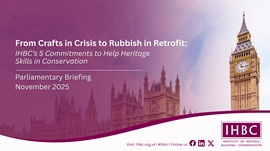Boss plaster in buildings
According to Housing and sound insulation, Improving existing attached dwellings and designing for conversions, prepared by the Scottish Building Standards Agency, Historic Scotland and Communities Scotland, and published in 2006, the term 'boss plaster ', refers to plaster that has lost its adhesion to the wall surface it was applied to.
This can occur when old plaster loses its strength and adhesive bond. This may result in cracking, or bulging, and when the surface is ‘tapped’, it may sound hollow (boss) and will probably need to be removed and a new coating applied.
[edit] Related articles on Designing Buildings Wiki
- Blockwork.
- Brick.
- Cement.
- Concrete.
- Dry lining.
- Masonry.
- Mortar.
- Pebbledash.
- Plaster.
- Quoin.
- Screed.
- Stucco.
[edit] External references
IHBC NewsBlog
Three reasons not to demolish Edinburgh’s Argyle House
Should 'Edinburgh's ugliest building' be saved?
IHBC’s 2025 Parliamentary Briefing...from Crafts in Crisis to Rubbish Retrofit
IHBC launches research-led ‘5 Commitments to Help Heritage Skills in Conservation’
How RDSAP 10.2 impacts EPC assessments in traditional buildings
Energy performance certificates (EPCs) tell us how energy efficient our buildings are, but the way these certificates are generated has changed.
700-year-old church tower suspended 45ft
The London church is part of a 'never seen before feat of engineering'.
The historic Old War Office (OWO) has undergone a remarkable transformation
The Grade II* listed neo-Baroque landmark in central London is an example of adaptive reuse in architecture, where heritage meets modern sophistication.
West Midlands Heritage Careers Fair 2025
Join the West Midlands Historic Buildings Trust on 13 October 2025, from 10.00am.
Former carpark and shopping centre to be transformed into new homes
Transformation to be a UK first.
Canada is losing its churches…
Can communities afford to let that happen?
131 derelict buildings recorded in Dublin city
It has increased 80% in the past four years.
Fate of historic Glasgow Vogue cinema decided after appeal
A decision has been made on whether or not it will be demolished.














